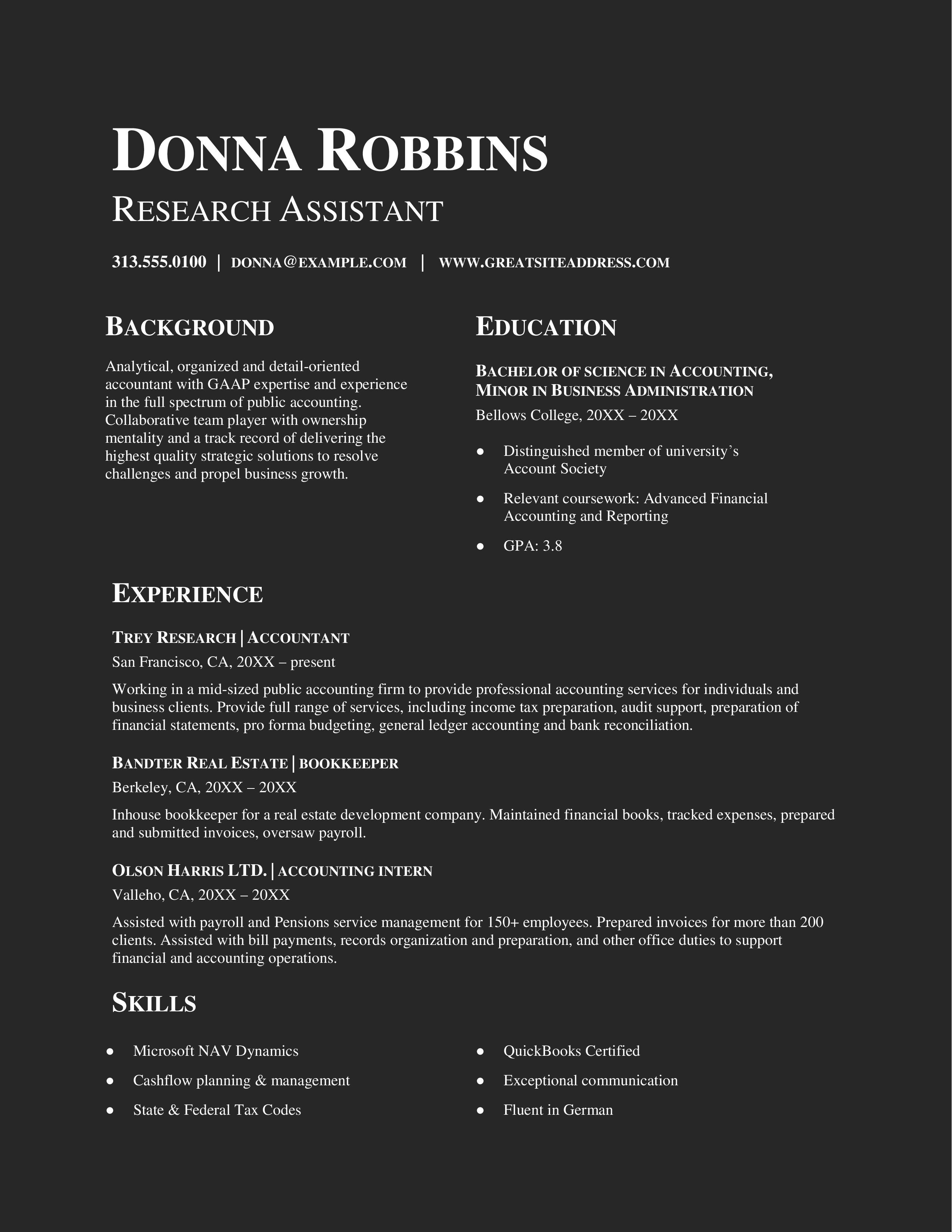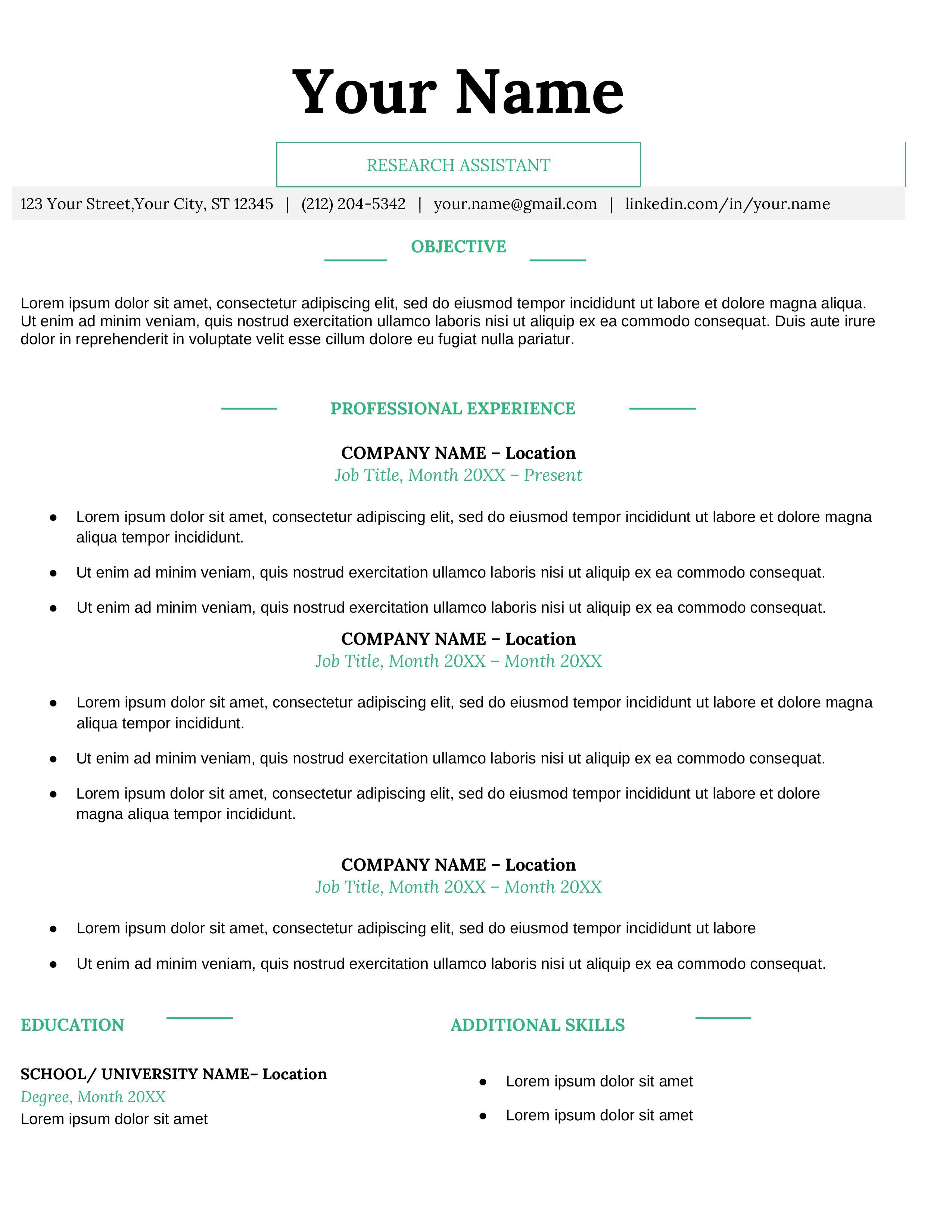Research Assistant Resume: How to Write a Professional Resume with Templates
Published on September 9th, 2024
Research assistants play a crucial role in the academic, scientific, and corporate sectors by supporting research projects, analyzing data, and contributing to reports. If you’re preparing to apply for a research assistant position, your resume should highlight your technical skills, research experience, and ability to work collaboratively.
In this blog, we’ll guide you through writing a research assistant resume that effectively showcases your expertise and sets you apart in today’s competitive job market.
Common Responsibilities of a Research Assistant
- Conduct literature reviews, synthesize findings, and prepare summaries for ongoing research projects.
- Assist in designing research studies, developing methodologies, and preparing research instruments.
- Collect, code, and analyze data using statistical tools such as SPSS, R, or Excel.
- Maintain detailed records of all experiments, including procedures, data sets, and analyses for reproducibility.
- Collaborate with multidisciplinary teams to ensure research goals are met and results are communicated clearly.
- Contribute to the preparation of research reports, papers, and presentations for conferences and publications.
- Manage participant recruitment and conduct surveys, interviews, or lab-based experiments.
- Ensure compliance with ethical guidelines and research protocols, safeguarding data confidentiality.
Research Assistant Resume Templates
Here are five resume templates tailored for research assistants:
Template 1
Template 2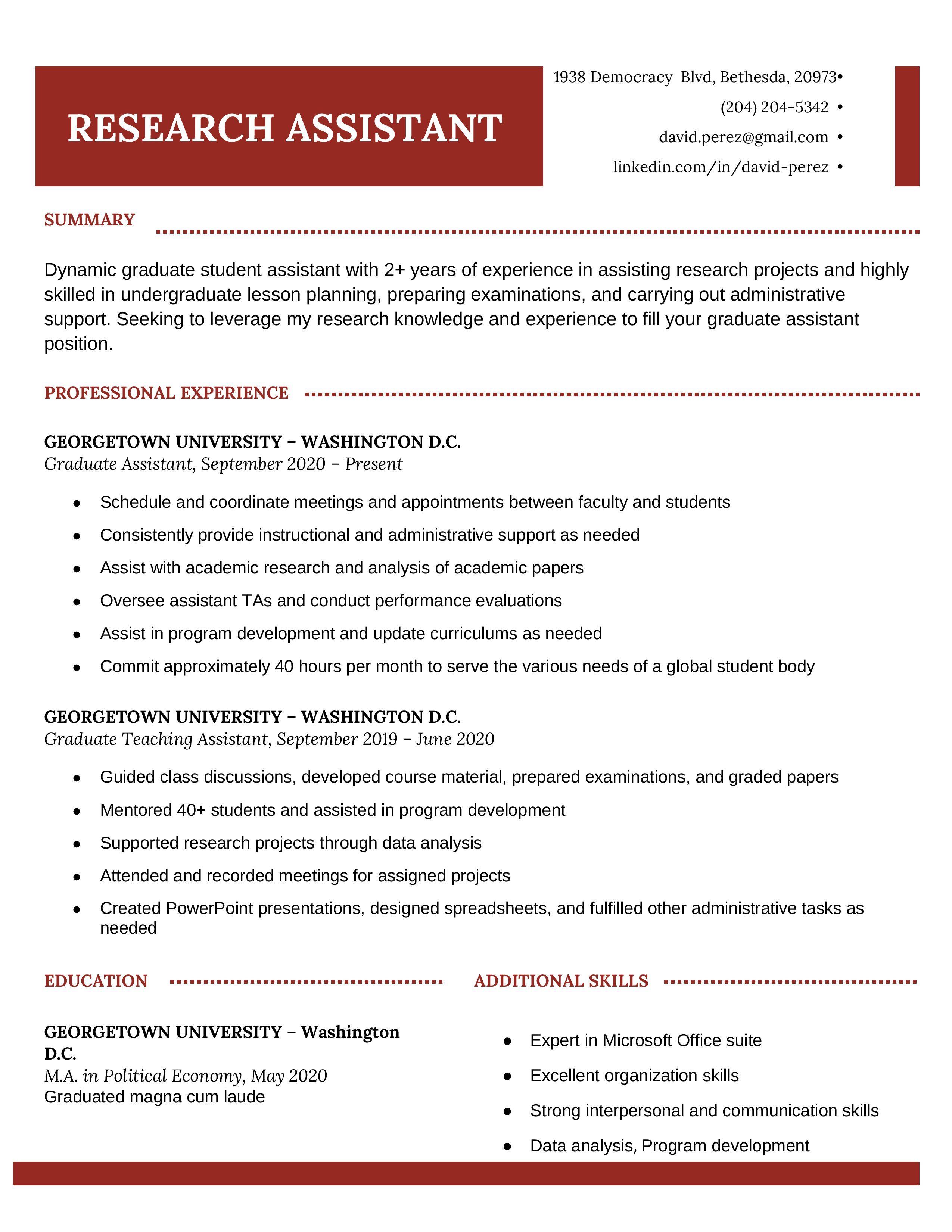
Template 3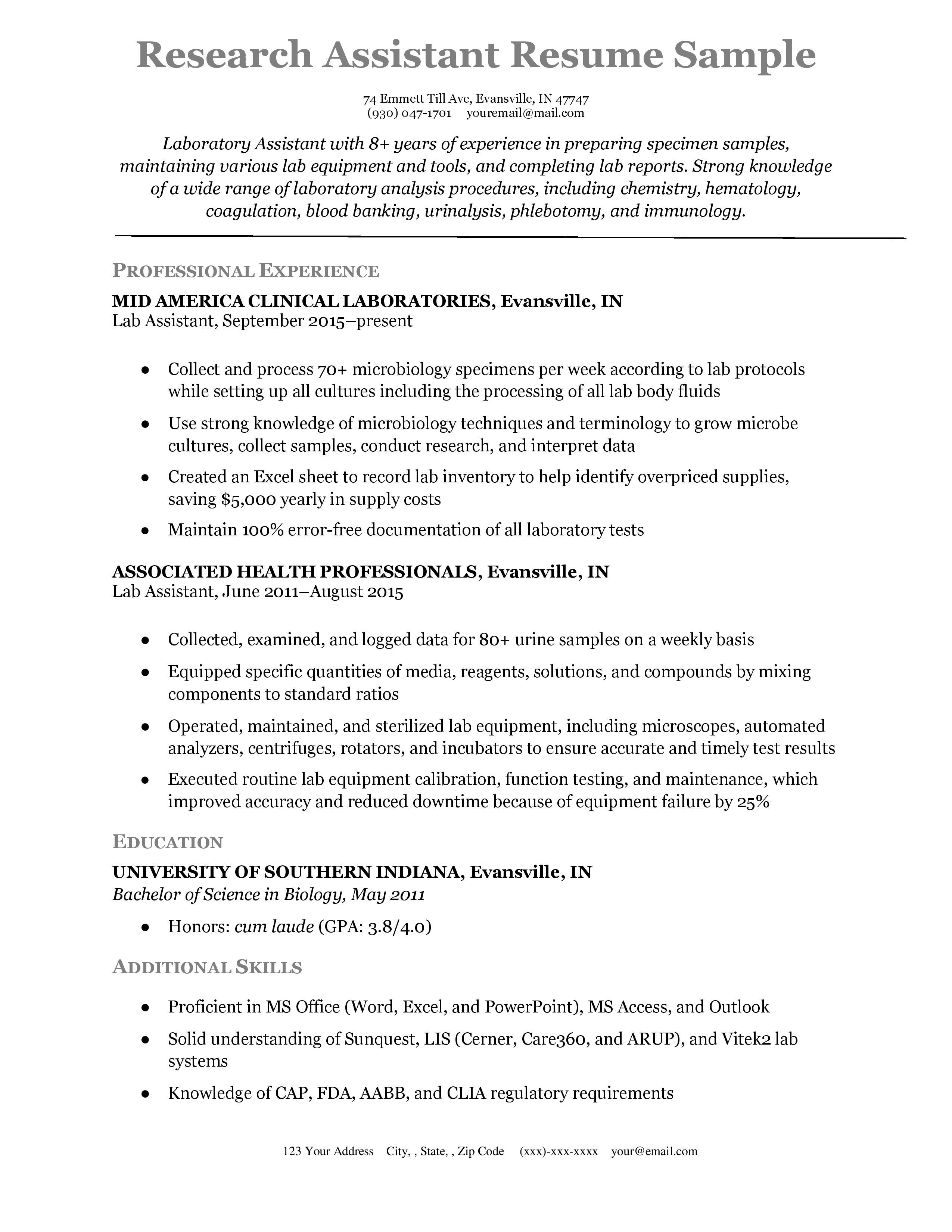
Template 4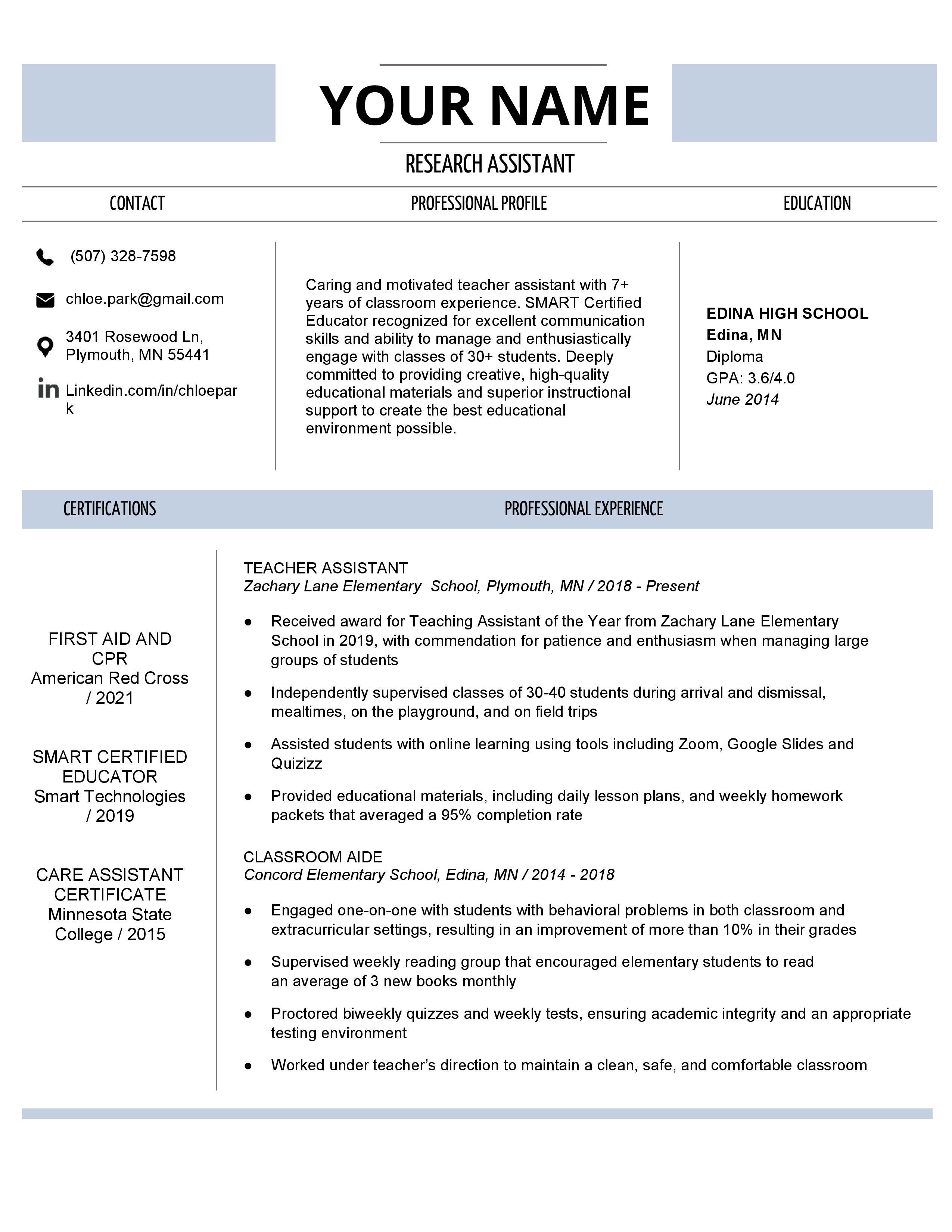
Template 5
How to Format a Research Assistant Resume?
A well-organized format is essential for a research assistant's resume. Use a professional font, such as Arial or Times New Roman, and ensure clear section headings. Include the following sections:
- Contact Information: Your name, phone number, email, and location.
- Professional Summary/Objective: A brief statement summarizing your qualifications, experience, or career goals.
- Skills: A list of technical skills, software proficiencies, and research-related competencies.
- Work Experience: Highlight relevant research experience in reverse chronological order.
- Certifications and Education: Showcase your academic achievements, certifications, and training.
How to Write Your Research Assistant Resume Experience?
When listing your work experience, focus on accomplishments that demonstrate your contributions to research projects. Start each bullet point with a strong action verb and include measurable results whenever possible.
Example:
- Conducted comprehensive literature reviews and synthesized findings to support a study on mental health interventions.
- Collected and analyzed data using SPSS, contributing to a peer-reviewed publication.
- Collaborated with a multidisciplinary team to design a survey that improved data collection accuracy by 15%.
How to Quantify the Impact on Your Resume?
Quantifying your achievements shows potential employers the direct impact of your work. Use numbers to highlight how your contributions advanced the research or improved workflows.
Example:
- Increased data processing efficiency by 20% by implementing automated coding techniques.
- Successfully recruited and managed a participant pool of 200+ individuals for a longitudinal study.
How Do I Write a Research Assistant Resume with No Experience?
If you’re applying for a research assistant position with little or no formal experience, focus on transferable skills, academic research projects, and any volunteer work. Use a strong objective statement that highlights your research interests and eagerness to learn.
Example: “Recent graduate with a Bachelor’s degree in Biology, eager to apply my research skills and laboratory experience in a professional research setting.”
How to List Your Hard Skills and Soft Skills on Your Resume?
Your research assistant resume should include both technical (hard) skills and interpersonal (soft) skills. Here’s how to list them:
Hard Skills:
- Statistical analysis (SPSS, R, Python)
- Data collection and coding
- Research design and methodology
- Literature review and synthesis
- Database management
Soft Skills:
- Critical thinking
- Communication with research teams
- Problem-solving in data analysis
- Attention to detail
- Time management and multitasking
How to List Your Certifications and Education on Your Resume?
Your education and certifications are key components of a research assistant resume. Be sure to include any specialized training or certifications relevant to your field of research.
Example:
- Master of Science in Biology, XYZ University, 2021
- Certified in Research Ethics and Compliance, CITI Program, 2022
- Data Analysis in R, Coursera, 2020
How to Write Your Research Assistant Resume Summary or Objective?
Your resume summary or objective should offer a snapshot of your skills and experience, tailored to the research field you’re applying for.
Example Summary:
“Research assistant with 3+ years of experience in supporting data-driven research projects, conducting literature reviews, and analyzing data. Proficient in SPSS and R, with a proven track record of collaborating in multidisciplinary teams to deliver high-quality research findings.”
Additional Sections for a Research Assistant Resume
Consider adding the following sections to your resume to highlight additional strengths:
- Publications and Presentations: List any research papers you’ve co-authored or presented at conferences.
- Volunteer Work: Include relevant volunteer experience in research labs or academic settings.
- Technical Proficiency: Mention any specialized tools or software you are proficient in, such as statistical packages or research databases.
How to Write a Specialization Section?
If you have expertise in a specific area of research, such as social sciences, biology, or clinical trials, create a specialization section to highlight this experience.
Example:
“Specialized in clinical research, with experience in participant recruitment, data management, and administering surveys for medical trials.”
Conclusion
A well-structured research assistant resume templates showcases your technical skills, academic background, and ability to contribute to research projects. Tailor your resume to the specific job you’re applying for and use the templates and tips provided to create a resume that stands out. Whether you’re an experienced research assistant or just starting your career, your resume should clearly communicate your strengths to potential employers in the research field.
Authors

Soujanya Varada
As a technical content writer and social media strategist, Soujanya develops and manages strategies at HireQuotient. With strong technical background and years of experience in content management, she looks for opportunities to flourish in the digital space. Soujanya is also a dance fanatic and believes in spreading light!
Hire the best without stress
Ask us how
Never Miss The Updates
We cover all recruitment, talent analytics, L&D, DEI, pre-employment, candidate screening, and hiring tools. Join our force & subscribe now!
Stay On Top Of Everything In HR

